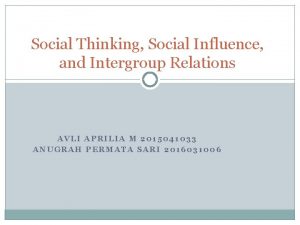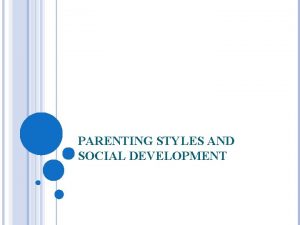Influence of Parenting Styles on the Social Development











- Slides: 11

Influence of Parenting Styles on the Social Development of Children in Adolescent P. K. S. S. Thilakarathna Department of Educational Psychology Faculty of Education University of Colombo

Introduction to study Right from the beginning of the child’s birth children learn and acquire traits and behaviors that they exhibit throughout their life time. During socialization, parents and other authoritative agents try to form children in such a way as to make them acquire worthwhile virtues cherish by the society. Parents traditionally are obligated to play this all important role of socializing their children in to their special environment as primary agents of socialization. The way and manner children are brought up is reckoned to be very essential to the development of the growing child.

Students who go through formal education are expected to be competent both academically and socially. That is very significance of being socially competent at school and at the work of world. Since parental roles are essentially formative, their influence in the socialization of children cannot be over emphasized. It is this understanding that precipitated this study which aimed at examining the influence of parenting behaviors and their activities on children’s educational outcomes. What are the parenting styles?

Objectives of the study Investigate the dominant parenting styles of parents. Examine the relationship between parenting styles and children’s social competence. Examine the influence of parenting behaviors and their activities on children.

Research design and methodology Research design – the study was carried out as a descriptive survey Research sample – government school children in grade 10 and class teachers - one hundred and twenty students from grade 10 - eight teachers Data analyzing – data gathered from interviews, questionnaires and relevant reports are analyzed quantitatively and qualitatively.

Parenting styles of respondents’ parents Parenting styles Number of students percentage Authoritative 83 69. 16 Authoritarian 20 16. 67 Permissive 17 14. 17 120 100. 00 Total

Parenting styles on educational background

Results of the study The results show that the dominant parenting style as perceived by the students is authoritative style. The study also revealed only few of them perceived their parents to be Authoritarian (16. 67%) and permissiveness (14. 17%). Thus 16. 67% of them regarded their parents as Authoritarian probably because the parents do exhibit behaviors such as setting strict rules for the children to follow, The findings of the study shows relationship between parenting style and child social outcomes. The study depict a positive correlation between authoritative parenting style and good social behavior.

Sugessions In the adolescent age, parent have to treat their children as rational beings to enable them to come out of themselves. Teachers also have to give their attention on them and monitor them to develop their social competence.

References Maccoby, E. E. and Martin, J. A. (1983). Socialization in the context of the family: Parent-child Psychology, Socialization, Personality, and Social Development. New York: Wiley. students. http: //digital. commons. bucknell. edu//masters theses. Retrieved on 10 th October, 2012. Steinberg L. , Dornbusch, S. M. and Brown B. B (1992). Ethnic differences in adolescent achievement: An ecological perspective. American Psychologist, 47 (4), 723 -729. Strage, A. A. and Brandt, T. S. (1999). Authoritative parenting and college students’ academic adjustment and success. Journal of Educational Psychology, 9 (1), 146 -156. Tay, E. L. and Tam, C. L. (2011). Relationship between perceived parenting styles and coping capability among Malaysian secondary school students. Proceedings of International Conference on Social Science and Humanity, 2, 20 – 23. Turner, E. A. , Chandler, M. and Heffer, R. W. (2009). Influence of parenting styles, achievement motivation, and self-efficacy on academic performance in college students. Journal of College Student Development, 50(3), 337 -346. -

Thank you
 4 types of parenting styles
4 types of parenting styles 4 kinds of parenting styles
4 kinds of parenting styles Lemasters and defrain
Lemasters and defrain Objectives of parenting styles
Objectives of parenting styles Permissive parenting
Permissive parenting Parenting styles assignment
Parenting styles assignment Social thinking adalah
Social thinking adalah Social thinking social influence social relations
Social thinking social influence social relations Social thinking and social influence in psychology
Social thinking and social influence in psychology Social thinking theory
Social thinking theory Tactile learner careers
Tactile learner careers Social style expressive
Social style expressive



















